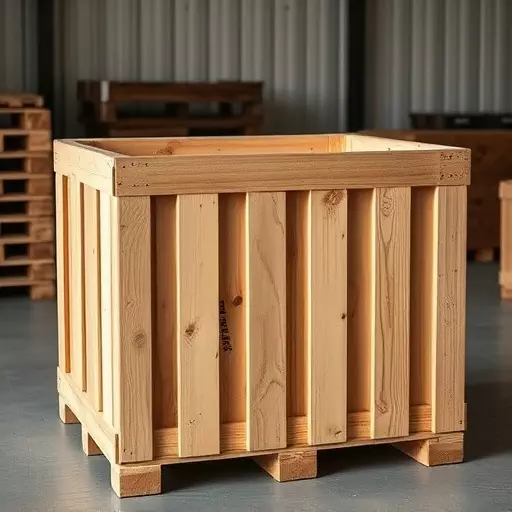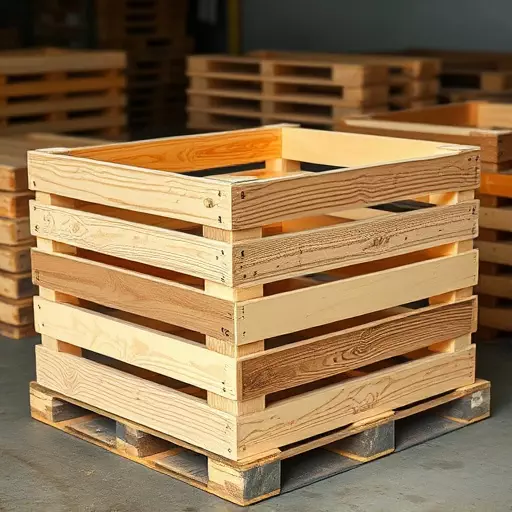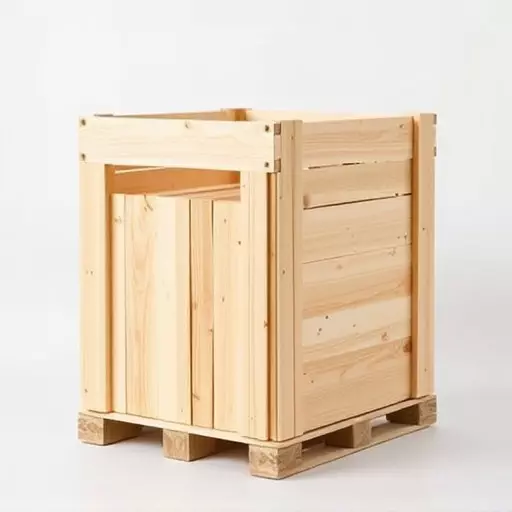- Understanding Corrugated Packaging and Its Benefits for Domestic Shipping
- The Rise of Eco-Friendly Wood Crate Solutions in Holland, Ohio
- Sustainable Wood Crate Manufacturing: A Closer Look at the Process
- Recyclable Wood Crates: Why They Are a Viable Alternative to Traditional Packaging
- The Impact of Corrugated Packaging on E-commerce and Domestic Shipping
- Best Practices for Implementing Eco-Friendly Wood Crate Solutions in Your Business
- Case Studies: Successful Adoption of Sustainable Wood Crate Manufacturing in Ohio
Understanding Corrugated Packaging and Its Benefits for Domestic Shipping

Corrugated packaging has revolutionized domestic shipping, offering a range of benefits that extend beyond simple protection for goods during transit. This innovative material is crafted from layers of paperboard, with a fluted (wavy) interior design that provides exceptional strength and shock absorption. For instance, sustainable wood crate manufacturing in Holland, Ohio, focuses on creating eco-friendly wood crate solutions that are not only durable but also recyclable, making them an ideal choice for environmentally conscious businesses.
In the realm of domestic shipping, corrugated packaging stands out due to its lightweight yet robust nature. Unlike traditional, solid wooden crates, which can be heavy and contribute to increased carbon footprints, recyclable wood crates offer a sustainable alternative. These eco-friendly wood crate solutions are designed with the environment in mind, ensuring that they can be easily recycled or repurposed once their shipping life cycle ends. This not only reduces waste but also supports businesses in their efforts to adopt greener logistics practices.
The Rise of Eco-Friendly Wood Crate Solutions in Holland, Ohio

In recent years, Holland, Ohio has emerged as a leader in sustainable wood crate manufacturing, driving the adoption of eco-friendly wood crate solutions throughout the region and beyond. This shift towards greener packaging options is largely fueled by growing consumer demand for environmentally conscious products and stringent regulatory frameworks aimed at reducing waste. Local businesses are responding by innovatively designing and producing recyclable wood crates that not only minimize environmental impact but also offer robust protection for goods during domestic shipping.
These eco-friendly wood crate solutions are transforming the landscape of packaging in Holland and its surrounding areas, as companies prioritize sustainability without compromising on quality or strength. By utilizing reclaimed and sustainably sourced wood, these manufacturers are creating a circular economy model that reduces deforestation and promotes resource conservation. This trend is expected to gain momentum, setting a new standard for responsible domestic shipping practices across the nation.
Sustainable Wood Crate Manufacturing: A Closer Look at the Process

In the quest for more eco-friendly and sustainable packaging options, sustainable wood crate manufacturing has emerged as a leading solution in Holland, Ohio. This innovative approach to creating wooden crates focuses on minimizing environmental impact while maximizing durability. The process involves carefully sourced renewable wood materials, ensuring that every step aligns with sustainability principles. By employing advanced woodworking techniques, manufacturers produce reusable, recyclable wood crates designed to withstand the rigors of domestic shipping.
Sustainable wood crate manufacturing in Holland, Ohio, goes beyond just creating eco-friendly products; it’s a comprehensive process. This includes responsible forest management, where trees are replanted to maintain a healthy ecosystem. The cutting-edge manufacturing techniques also involve precise engineering to reduce material waste and energy consumption. As a result, these wooden crates not only offer robust protection for goods in transit but also contribute to a greener environment by being fully recyclable and promoting sustainable forestry practices.
Recyclable Wood Crates: Why They Are a Viable Alternative to Traditional Packaging

In the quest for more eco-friendly and sustainable packaging solutions, recyclable wood crates are emerging as a viable alternative to traditional packaging methods. These wooden crates, produced through sustainable wood crate manufacturing in Holland, Ohio, offer a compelling solution for domestic shipping due to their robust design and environmental benefits. The process of creating these crates involves responsible forestry practices and innovative manufacturing techniques, ensuring a reduced carbon footprint compared to plastic or non-recyclable materials.
By opting for eco-friendly wood crate solutions, businesses can contribute to a circular economy where resources are reused and recycled. These crates are not only sturdier than many traditional packaging options but also easily recyclable, reducing waste in the shipping process. This shift towards sustainable wood crate manufacturing aligns with the growing consumer demand for greener alternatives, making it a smart choice for businesses looking to minimize their environmental impact while ensuring the safe transport of goods.
The Impact of Corrugated Packaging on E-commerce and Domestic Shipping

The rise of e-commerce has significantly transformed domestic shipping landscapes, with an increasing number of packages making their way across borders and through neighborhoods every day. To keep up with this growth, the packaging industry has seen a shift towards more sustainable and eco-friendly solutions. One such innovation is the adoption of corrugated packaging, particularly recyclable wood crates, in both e-commerce fulfillment centers and domestic shipping operations.
In the realm of sustainable wood crate manufacturing Holland, Ohio stands out as a hub for innovative eco-friendly wood crate solutions. These wooden crates offer several advantages over traditional cardboard boxes, including enhanced durability, reusability, and recyclability. By leveraging sustainable wood resources and implementing efficient manufacturing processes, these Ohio-based manufacturers contribute to reducing the environmental footprint associated with shipping while providing robust protection for fragile items during transit.
Best Practices for Implementing Eco-Friendly Wood Crate Solutions in Your Business

Implementing eco-friendly wood crate solutions is a significant step towards sustainability for any business involved in domestic shipping. For those seeking to adopt greener practices, sustainable wood crate manufacturing in Holland, Ohio, offers a promising path forward. Local companies specializing in this field provide innovative and recyclable wood crates designed to minimize environmental impact without compromising strength and durability.
Best practices include partnering with these local manufacturers who utilize reclaimed or sustainably sourced wood, employ efficient production methods reducing waste, and offer customizable crate designs for optimized shipping needs. Additionally, establishing clear communication channels ensures proper care and recycling of the wooden crates upon arrival at their final destinations, fostering a closed-loop system that further enhances eco-friendliness.
Case Studies: Successful Adoption of Sustainable Wood Crate Manufacturing in Ohio

In recent years, a notable case study highlights the successful adoption of sustainable wood crate manufacturing in Holland, Ohio. Local businesses have embraced eco-friendly wood crate solutions, leading to significant environmental benefits and cost savings. This initiative focused on utilizing reclaimed and sustainably sourced wood to create recyclable wood crates, reducing the reliance on traditional plastic or non-biodegradable packaging materials. The shift towards sustainable wood crate manufacturing has not only minimized waste but also fostered a circular economy within the region.
The success of this project underscores the potential for other domestic shipping industries to adopt similar practices. By choosing recyclable wood crates over conventional options, companies in Holland, Ohio, have demonstrated that sustainability and practicality can go hand in hand. This approach not only reduces the environmental footprint but also positions businesses as responsible stewards of natural resources, contributing to a greener future for domestic shipping and beyond.


